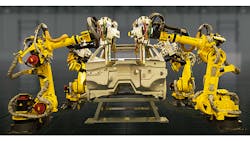Fanuc Corp., the Japanese robot maker whose profit margins once exceeded 40%, may be in for leaner times, according to its new president, Kenji Yamaguchi.
The same day in late April that Yamaguchi was named as the right-hand man to Fanuc’s CEO, Yoshiharu Inaba, the company forecast profit would fall by almost half. The shares slid 13% over the next two trading days.
“Yamaguchi-san had a little bit of a baptism by fire,” said Graeme McDonald, a technology analyst at Citigroup Inc. in Tokyo who’s followed Fanuc for almost two decades. “Earnings are under so much pressure — and a lot of that is out of the hands of Inaba and Yamaguchi.”
For all that, Yamaguchi appeared relaxed when he sat down this week at Fanuc’s headquarters on the slopes of Mount Fuji to talk about running one of the world’s most important suppliers of factory equipment at a time when China, the world’s factory, is growing at its slowest pace since 1990. China, with the rest of Asia excluding Japan, accounted for 42% of the company’s revenue in the year ended March.
The 48-year old engineer, who was wearing Fanuc’s trademark yellow blazer, had a message for any investor expecting operating profit margins to return to the levels of 2011, when they peaked at 43%: Those days are gone for now.
“I shouldn’t be saying this,” Yamaguchi said, “but I think that was probably too much. There were a lot of factors at play and underinvesting for the future was probably one of them.”
Robot Capacity
The company is now trying to rectify that by embarking on a series of investments that might not bear fruit for five or even 10 years. Last month, Fanuc announced it had purchased land for a new industrial robot factory and Yamaguchi said it plans to spend several hundred million dollars to as much as double its production capacity for them.
In May, the company completed two new research centers at its headquarters. To staff them, Yamaguchi said Fanuc more than tripled its hiring of engineers over the last few years to about 100 annually. Overall, headcount has grown by more than 1,000 since 2013, a 20% increase.
Even with the spending, Fanuc’s operating margin is likely to be 26% this fiscal year, according to the company’s latest forecast made in July.
Fanuc has long been known for holding its investors — and everyone else — at arm’s length. There are signs of a detente. After years of shareholder complaints that the company was hoarding cash in an unproductive way — in the year through March 2015 Fanuc had zero debt and $8.3 billion in cash and short-term investments — it doubled its dividend payout ratio in the period. It also began to hold earnings briefings for the first time in years. Long-term investors and the media have been given tours of the company’s factories, something unthinkable only years ago.
Forging Partnerships
The most important sign of change has been Fanuc’s tie-ups with other companies. In April, Fanuc announced a partnership with Cisco Systems Inc., Rockwell Automation Inc. and a Tokyo-based company called Preferred Networks Inc. on software to make factory robots and machine tools smarter and more interconnected.
Last year Fanuc paid 900 million yen for a 6% stake in Preferred Networks, a developer of artificial intelligence software that enables Fanuc’s robots to acquire skills independently. The two companies are working on applications that predict machine failures to prevent costly work stoppages
“They are changing,” said Citigroup’s McDonald. “Some of the hubris has been whittled away. This belief that you’ve got all the answers is not there anymore.”
It was a sensitive subject, but Yamaguchi said the company had become more nimble since the 2013 retirement of its founder, Seiuemon Inaba, at age 88. Seiuemon’s 68-year-old son, Yoshiharu, is now in charge.
“You get to be certain age,” Yamaguchi said, before stopping himself. “The company has just gotten too big for one person to handle. In the few years before 2013 we fell behind a little bit but I think we’ve been able to make up a lot of that ground.”
By Jason Clenfield and Masatsugu Horie
About the Author
Bloomberg
Licensed content from Bloomberg, copyright 2016.
